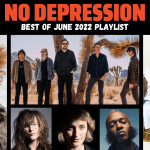Brooks & Dunn’s Last Rodeo Ropes Merle Haggard for the Final Ride
Brooks & Dunn w Merle Haggard
Blossom Music Center, Cuyahoga Falls, Ohio
August 26, 2010
Brooks & Dunn came to represent the machined honky tonk of the post-Garth Brooks country explosion as much as any act that emerged in the ‘90s. But what that oversimplication missed as two men – both in their 30s when the record deal came – who had punched it out in icehouses, chicken-wire protected honky tonks and the occasional dance halls on their way to fame and glory.
Long known for their high impact, no trick left unturned way of taking the stage – giant inflatable girls? Balloon blowing goats? Mirrored steer heads turning under spotlights? BRING IT! – for their final tour, Ronnie Dunn and Kix Brooks made the brave call to strip it back, strip it down and let the music do the heavy lifting. A wise decision, as the B&D band is one of the most ferocious in any genre, and their ability to punch out raw knuckled rock, buoyant bar-room country, the occasional languid ballad or sweeping bit of gospel is all well within their reach.
More importantly, by divesting of the show business wizardry, the singing and writing talents that have sustained them for 20 years, three reinventions and a run that’s made them the biggest selling duo in the world behind Simon & Garfunkle were what they chose to focus on for what’s been billed as the Last Rodeo.
Throwing down the gauntlet with the steroidal industrotonk of “Play Something Country” and “Can’t Take The Hionky Tonk Out of the Girl,” Brooks & Dunn strode onstage in a dustcloud of beating drums, big guitars and a steel that felt like the kerosene spray for maximium fire-throwing effect. Bigger, bolder, louder is what has defined Brooks & Dunn’s approach to modern roadhouse country – and their opening salvos brought home that this is what 21st century Waylon Jennings or Gary Stewart most likely would’ve sounded like.
To that end, they kept it up for three more songs… Guns blazing, it was about the hard-charge from the gate, then settling into the more wistful side of the true man’s inner life. Kix Brooks came center for the bravely resolved “You’re Gonna Miss Me,” delivered with a stroicism tempered with enough ache that gave the sense it might just hurt him a little bit more than the one who’s gone.
After reprising “Ain’t Nothing ‘Bout You,” the song that launched their 2000 rebirth, Brooks went down center on a stool for the songwriter turn on “Last Rodeo,” some mirthful asides including a good-natured shot at the rumor-mongering “He (Dunn) hates it when I do this… Now you know why we broke up” and the lesser known “Lost & Found.”
Dunn, of the muscular tenor that can take concrete off clouds, came center for his fidelity pledge “That’s What She Gets” and the survival of the long gone “Getting Better All the Time.” It is in the quietest moments, the power and conviction that marks Dunn’s interpretative skills truly emerge. He has the ability to color an emotion that doubt, with falter, with strength earned from adversity – and it reminds listeners it’s not about how much air can a singer shove around, nor the tone of a given voice that should define greatness. This is a man who can interpret and embody the complex as if it were the simplest folk song.
Towards the end of the show’s mddle section, the pair drew a pair of knock-down classics: the recognition of rapture where you are in the mandolin-soaked “Red Dirt Road” and the deliverance from this life to the eternal bliss that is “Believe.” Each song is transformative in its own way: the former from the innocence and sweep of seeing how sweet life is, the latter for the celebratory nature of faith and the rewards to come.
For Dunn, who would spin around the always turbo-lifting “My Maria” like the parallel bars and “Neon Moon” with the appreciation of a Cain’s Ballroom vet, the euphoria of “Red Dirt” and the true witness of “Believe” did more to ground the argument that he may well be the greatest country singer to ever live. Control. Passion. Restraint, Nuance. And that voice… which ripples is in its whiskey-soaked electricity of tone.
Yes, they brought the military out for “Only In America,” not as a trick, but as a final salute to the men and women in uniform. At a time when the nation is in seeming tumult, this love song to the possibilities of the American dream remains as heady as the week it went into #1 in the wake of the World Trade Center Towers falling.
Encoring with “Brand New Man,” their first #1, and “Boot Scoot Boogie,” which created the dance craze that set the strip mall hionky tonk epidemic into motion, they reminded the nearly sold-out amphitheatre just why the ride had been so long and so consistent: they bring their passion, their lives lived in local bars selling beer, getting folks on the dancefloor, but especially playing attention to the things that mattered to the people who came for their music way back when.
It’s not about fancy video screens, or dancing girls – though B&D’s female singers bring a 3-part harmony that packs a mean wallop, as well – but the idea of a working man’s band playing hard – and helping people kick-out the lights for even just one night. It is the pain of losing, the thrill of finding, the hope for something more and – especially – the courage to get up every day, punch the long and know that you’re a man who works for what he has, stands tall behind his family and knows how to have a good time when the time ts right.
Ironic the iconic Merle Haggard would serve as the most awarded duo in country music history’s opening act – given Haggard’s own status as a legend. For Brooks & Dunn, knowing this was the final run of a very distinguished show, the pair opted for an artist who inspired them, engaged them and especially who they felt deserved the opportunity to be heard by their fans one last time.
In a pair of black wrap around glasses and an old school black fedora perched on his head, the lean Lake Shasta, California resident took those wise enough to be in their seats on a full-immersion survey course in just why country music is the essence of life’s often rugged side. And it’s not just about bar-rooms, though Haggard did a wondrous turn on “Swinin’ Doors,” but the difficulty of making ends meet – the chugging “Workingman’s Blues” – and trying to find the space within life to exhale – the tenderly sad “Silver Wings.”
In the course of a 65 minute-set that had no fat, Haggard served as a personal, one-stop jukebox of most of country music’s most enduring modern standards. With the suppleness that bordered on juicy, he and the Strangers leaned into “Big City” with the fluidity of Western swing channeled into ‘80s mainstream country. Introduced as “a song I wrote during the last depression” as a jolt of commentary on today’s economic woes, he clearly savored the notion of “take your so called Social Security…” as he hit the city limits for wide open spaces.
Social commentary has always been shot through Haggard’s repertoire. If the anthemic social change-rebuking “Okie From Muskogee” was a rabble-rousing set culminator, the languishing “Are The Good Times Really Over?” – which he Puck-ishly started over to reframe the lyrics from “I wish Coke was still Cola and a joint was a bad place to go…” to “a joint was a good place to go” — asked all the hard questions, contrasted true Dust Bowl refugee work ethics and dignity with a realm of entitlement.
Equally harrowing was his read of “Sing Me Back Home,” a song inspired from Haggard’s stay in San Quentin for breaking and entering. Writing empathetically of the consequences of wrong, it’s a sobering reality to understand that the price paid for the wayward ant-hero of the song was the electric chair – the kind of juxtaposed death song that was once the genre’s bedrock.
As a perfect foil, Haggard and the Strangers revved up their attack for Johnny Cash’s “Folsom Prison Blues,” a song that had the audience pumping their fists in identification. Homage was also paid to Bob Wills, with his twin fiddles and the reeling “Take Me Back To Tulsa,” with Haggard putting down his guitar and sawing away in tandem with Scott Joss.
Haggard understands it’s about the roots as much as the future. To go forward, you need to honor where you come from – then you need to tell the truth about what you’ve seen. It isn’t always dire. As Brooks & Dunn represented on several numbers, there are can be joy and a wink and some fun. Haggard’s not as known, but certainly classic “Rainbow Stew” is as light-hearted and draw-you-in as anything in his catalogue, and it was given a proper exuberance under the redwood pavilion outside Cleveland and Akron, Ohio.
To understand legacy, something Brooks & Dunn are now navigating it comes down to the truly non-negotiable: the music, the songs, the way the gave people who don’t have the luxury of introspection insight into the lives they’re living. Over the course of two decades, B&D were the grounding for just that…
For Merle Haggard, now well established in his 7th decade and a man who didn’t hit universal fan until well into adulthood, it is about the dignity he imbues songs that have become the fabric of generation-after-generation’s lives. Unlike Dunn who is a full-throttle singer, Haggard exhales the notes, letting the lyric float on top like so many clouds; it is that effortlessness that draws you in and holds you close to whatever story or intimacy he’s sharing.
Haggard, who has his wife Theresa singing back-up and his son Ben playing lead guitar, is a celebration of living life on his own terms, not to mention to play that guitar like a weapon: punctuating the feeling or riveting the melody with some well-timed flourishes and twists.
It is everything country music – when it’s good should be. For the man who’s into his 5th decade as a
performer, the end result is already determined. For Brooks & Dunn, who play their final show in Nashville on Thursday, Sept 2, it remains to be seen; but letting the music lead and the tricks fade just a little, they have a far better chance of their long-term impact being seen for the mark they left on country at the turn of the century versus being remember as shameless showman who merely knew how to entertain.




